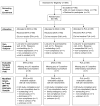Inflammation as a predictive biomarker for response to omega-3 fatty acids in major depressive disorder: a proof-of-concept study
- PMID: 25802980
- PMCID: PMC4581883
- DOI: 10.1038/mp.2015.22
Inflammation as a predictive biomarker for response to omega-3 fatty acids in major depressive disorder: a proof-of-concept study
Abstract
This study explores whether inflammatory biomarkers act as moderators of clinical response to omega-3 (n-3) fatty acids in subjects with major depressive disorder (MDD). One hundred fifty-five subjects with Diagnostic and Statistical Manual of Mental Disorders, 4th Edition (DSM-IV) MDD, a baseline 17-item Hamilton Depression Rating Scale (HAM-D-17) score ⩾ 15 and baseline biomarker data (interleukin (IL)-1ra, IL-6, high-sensitivity C-reactive protein (hs-CRP), leptin and adiponectin) were randomized between 18 May 2006 and 30 June 2011 to 8 weeks of double-blind treatment with eicosapentaenoic acid (EPA)-enriched n-3 1060 mg day(-1), docosahexaenoic acid (DHA)-enriched n-3 900 mg day(-1) or placebo. Outcomes were determined using mixed model repeated measures analysis for 'high' and 'low' inflammation groups based on individual and combined biomarkers. Results are presented in terms of standardized treatment effect size (ES) for change in HAM-D-17 from baseline to treatment week 8. Although overall treatment group differences were negligible (ES=-0.13 to +0.04), subjects with any 'high' inflammation improved more on EPA than placebo (ES=-0.39) or DHA (ES=-0.60) and less on DHA than placebo (ES=+0.21); furthermore, EPA-placebo separation increased with increasing numbers of markers of high inflammation. Subjects randomized to EPA with 'high' IL-1ra or hs-CRP or low adiponectin ('high' inflammation) had medium ES decreases in HAM-D-17 scores vs subjects 'low' on these biomarkers. Subjects with 'high' hs-CRP, IL-6 or leptin were less placebo-responsive than subjects with low levels of these biomarkers (medium to large ES differences). Employing multiple markers of inflammation facilitated identification of a more homogeneous cohort of subjects with MDD responding to EPA vs placebo in our cohort. Studies are needed to replicate and extend this proof-of-concept work.
Conflict of interest statement
The remaining authors report no conflicts of interest.
References
-
- Ridker PM. Inflammatory biomarkers and risks of myocardial infarction, stroke, diabetes, and total mortality: implications for longevity. Nutrition reviews. 2007 Dec;65(12 Pt 2):S253–9. Epub 2008/02/05. eng. - PubMed
Publication types
MeSH terms
Substances
Grants and funding
LinkOut - more resources
Full Text Sources
Other Literature Sources
Medical
Research Materials
Miscellaneous


